I’ll be speaking this Saturday at the Freethought Festival in Madison, Wisconsin (follow the link to register!) on the topic “Truth, Provability and the Fabric of the Universe”. I’ll be glad to see you there.
I’ll be speaking this Saturday at the Freethought Festival in Madison, Wisconsin (follow the link to register!) on the topic “Truth, Provability and the Fabric of the Universe”. I’ll be glad to see you there.
Pope Francis is coming to New York, and Cardinal Timothy Dolan is disturbed about ticket-scalping:
“Tickets for events with Pope Francis are distributed free [via lottery] for a reason — to enable as many New Yorkers as possible, including those of modest means, to be able to participate in the Holy Father’s visit to New York,” Cardinal Dolan, the archbishop of New York, said in a statement. “To attempt to resell the tickets and profit from his time in New York goes against everything Pope Francis stands for.”
So according to Cardinal Dolan, “everything Pope Francis stands for” consists of the proposition that for New Yorkers of modest means, nothing should take precedence over turning out to see Pope Francis — not groceries, not medicine, not car repairs, not any of the other things that people can buy with the proceeds from selling their tickets.
I doubt that Pope Francis is quite as egomaniacal as the Cardinal paints him. But apparently the Cardinal himself would rather see poor people cheering for the Pope than improving their lives.
In yesterday’s post, I claimed to have refuted Richard Dawkins’s claim that everything complex must have emerged from something simple by citing the natural numbers, which are provably highly complex (in a very precise sense) yet did not emerge from something simple. Numerous commenters suggested that I’d been unfair to Dawkins, because he’d surely meant his claim to apply only to biological processes.
Here is a quote from Dawkins’s book “The God Delusion”:
Time and again, my theologian friends returned to the point that there had to be a reason why there is something rather than nothing. There must have been a first cause of everything, and we might as well give it the name God. Yes, I siaid, but it must have been simple and therefore, whatever else we call it, God is not an appropriate name….The first cause that we seek must have been the simple basis for a self-bootstrapping crane which eventually raised the world as we know it into its present existence.
I could provide additional quotes, but this one should suffice. Dawkins believes, unless I have misunderstood him completely, that he has a quite general argument, not tied in any way to biology (because the above quote, for example, has nothing to do with biology) to establish that complex structures must have simple causes. That argument, whatever it might be, cannot be correct because the natural numbers stand as a counterexample.
If Dawkins, or any of his defenders, wants to respond that his argument is not intended to apply to the natural numbers, it becomes incumbent on them to point to a hypothesis which is actually used in the argument which would rule out such an application. Absent such a hypothesis, the argument must be erroneous.
I claim to have explained in The Big Questions exactly how the first cause of our Universe could be a mathematical structure that is far more complex than the Universe itself; of course others, like Max Tegmark, have demonstrated this possibility in far more detail than I have. Whether or not Tegmark and I are correct in our beliefs, I claim we’ve at least demonstrated that (as far as we can tell) those beliefs could be true, which, once again, refutes Dawkins’s position.
An argument that leads to flat-out wrong conclusions cannot be a correct argument, even if some of its implications turn out to be true. So I stand by what I said both yesterday and in The Big Questions : Dawkins’s position fails for exactly the same reason that Michael Behe’s does — we have an explicit example that shows that complexity requires neither a simpler antecedent nor a designer.
Bob Murphy, always my favorite theist, posts a defense of Intelligent Design theory, or at least an attack on its attackers, who, he claims, have largely failed to grasp what the ID theorists, such as Michael Behe, are claiming:
Behe is fine with the proposition that if we had a camera and a time machine, we could go observe the first cell on earth as it reproduced and yielded offspring. There would be nothing magical in these operations; they would obey the laws of physics, chemistry, and biology. The cells would further divide and so on, and then over billions of years there would be mutations and the environment would favor some of the mutants over their kin, such that natural selection over time would yield the bacterial flagellum and the human nervous system.
Yet Behe’s point is that when you look at what this process spits out at the end, you can’t deny that a guiding intelligence must be involved somehow.
(Emphasis added.)
Perhaps Bob has forgotten that I disposed of this argument in Chapter 4 of The Big Questions , with a single counterexample that refutes both Behe and his polar opposite Richard Dawkins in one fell swoop. Let’s recall their positions, stated as simply as possible:
Behe: Irreducible complexity requires an intelligent designer.
Dawkins: Irreducible complexity requires evolution. (This is Dawkins’s stated position in his book The God Delusion.)
Landsburg: The natural numbers are irreducibly complex, moreso (by any reasonable definition) than anything in biology. But the natural numbers were not designed and did not evolve, so Behe and Dawkins are both wrong.
 |
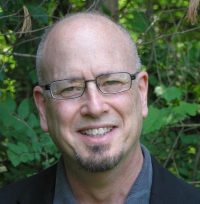 |
With great humility, I am honored to inform you that Eric Crampton of Offsetting Behavior has nominated me for sainthood.
Riffing off yesterday’s Acta Sanctorum post, Eric is asking for your help in making this a reality:
So, here’s the campaign for Saint Steven.
- Any of you who have any kind of illness at all pray to Steven Landsburg for intervention.
- If you do not receive divine Landsburgean intervention, don’t tell me about it.
- If you do receive divine Landsburgean intervention, please leave a record of such in the comments. Preferably with a link to a doctor’s note saying that your recovery was unexpected and pretty remarkable. This should happen in maybe 1% of cases.
- We submit the documented evidence of the successes, while ignoring the failures. Ta-dah! Saint Steven.
My hope is to beat John Paul II’s record of two reported cures, plus the toppling of one Evil Empire, or, at a minimum, the National Endowment for the Arts. Oh, and while I’m at it I have a couple of other worldly improvements in mind. Watch your step, Paul Krugman!
 So if I have this right, it is now the official position of the Catholic church that:
So if I have this right, it is now the official position of the Catholic church that:
For God’s sake (you should pardon the expression), if you’re looking to make the case that John Paul II was capable of performing (or at least catalyzing) genuine miracles, isn’t the defeat of Soviet Communism good enough? That right there makes him a saint in my book — though if I ever come to believe that he can cure aneurysms and has been holding out on us, I might have to retract my endorsement.
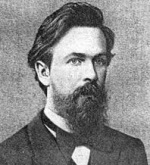 |
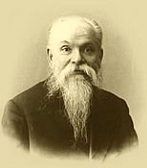 |
If you study economics, or statistics, or chemistry, or mathematical biology, or thermodynamics, you’re sure to encounter the notion of a Markov chain — a random process whose future depends probabilistically on the present, but not on the past. If you travel through New York City, randomly turning left or right at each corner, then you’re following a Markov process, because the probability that you’ll end up at Carnegie Hall depends on where you are now, not on how you got there.
But even if you work with Markov processes every day, you’re probably unaware of their origins in a dispute about free will, Christianity, and the Law of Large Numbers.
 I don’t trust rocks. Rocks keep fooling me. They sit there looking all solid until you examine them more carefully and find out they’re mostly empty space, with a smattering of charged particles here and there. Then you look a little deeper and find out those charged particles are nothing like they first appeared. They don’t even have locations. Rocks, and their constituents, are nothing at all like they first present themselves. But at least they’re real. I think.
I don’t trust rocks. Rocks keep fooling me. They sit there looking all solid until you examine them more carefully and find out they’re mostly empty space, with a smattering of charged particles here and there. Then you look a little deeper and find out those charged particles are nothing like they first appeared. They don’t even have locations. Rocks, and their constituents, are nothing at all like they first present themselves. But at least they’re real. I think.
Now here’s what genuinely baffles me: Apparently there are people in this world (and even, occasionally, in the comments section of this blog) who haven’t the slightest doubt about the existence of rocks, galaxies, squirrels, and the rest of the physical universe, but who suddenly turn into hardcore skeptics re the existence of mathematical objects like the natural numbers. (Many of these people, I suspect, are in fact affecting skepticism because of a badly mistaken belief that it makes them look sophisticated. But that’s speculation on my part, so let’s put it aside and take their positions at face value.) I just don’t get this. Why on earth would, say, a scientist, commit to the belief that there’s a physical universe out there but not a mathematical one, when we know that our perceptions of the physical universe demand constant revision, whereas our perceptions of the mathematical universe are largely eternal. My conception of the natural numbers is very close to Euclid’s; my conception of an atom bears almost no resemblance to Demosthenes’s.
I’ve been a little swamped lately and my daily blogging has fallen off. Until things get back to normal, I think I’ll fill the breach by reprinting a few of my old columns from Slate. Today’s entry is on “Why Jews Don’t Farm”.
—————————-
In the 1890s, my Eastern European Jewish ancestors emigrated to an American Jewish farming community in Woodbine, N.J., where the millionaire philanthropist Baron de Hirsch provided land, tools, and training at one of the nation’s first agricultural colleges. But within a generation, the family had settled in Philadelphia where they became accountants, tailors, merchants, and eventually, lawyers and college professors.
De Hirsch had a vision of American Jews achieving economic liberation by working the land. If he’d had a better sense of history, he would have built not an agricultural college but a medical school, because for well over a millennium prior to the settlement of Woodbine, Jews had not been farmers—not in Palestine, not in the Muslim empire, not in Western Europe, not in Eastern Europe, not anywhere in the world.
You have to go back almost 2,000 years to find a time when Jews, like virtually every other identifiable group, were primarily an agricultural people. Around A.D. 200, Jews began to quit the land. By the seventh century, Jews had left their farms in large numbers to become craftsmen, artisans, merchants, and moneylenders—the only group to have given up on agriculture. Jewish participation in farming fell to about 10 percent through most of the world; even in Palestine it was only about 25 percent. Everyone else stayed on the farms.
(Even in the modern state of Israel, where agriculture has been an important component of the economy, it’s been a peculiarly capital-intensive form of agriculture, one that employed well under a quarter of the population at the height of the Kibbutz movement, and less than 3 percent of the population today.)
The obvious question is: Why? Why did Jews and only Jews take up urban occupations, and why did it happen so dramatically throughout the world? Two economic historians—Maristella Botticini (of Boston University and Universitá di Torino) and Zvi Eckstein (of Tel Aviv University and the University of Minnesota)—have recently been giving that question a lot of thought.
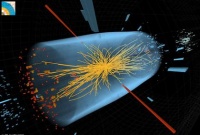 The apparently imminent discovery of the Higgs boson by scientists at CERN will have at least one quirky side effect that appears to have gone entirely unremarked until the appearance of this blog post — it threatens to inflict fatal collateral damage to the brilliant, eccentric and infuriating Omega Point Theory proposed by the physicist Frank Tipler.
The apparently imminent discovery of the Higgs boson by scientists at CERN will have at least one quirky side effect that appears to have gone entirely unremarked until the appearance of this blog post — it threatens to inflict fatal collateral damage to the brilliant, eccentric and infuriating Omega Point Theory proposed by the physicist Frank Tipler.
Tipler, who is not a crackpot, once published a book called The Physics of Immortality, purporting, on the basis of orthodox physics plus some plausible auxiliary assumptions, to establish the existence of an omnipotent, omniscient, omnipresent and altruistic “being” who will one day resurrect everyone who has ever lived to eternal life.
The first step toward that startling conclusion is the assumption that our descendants will not allow all life to come to an end. This in turn will require them to control the evolution of the Universe so that it doesn’t collapse in anything that human beings perceive as a finite amount of time; Tipler argues that they’ll quite plausibly have the technology to do that. But all this future tinkering with the shape of the Universe has consequences that (in a very rough sense) radiate backward and forward through time. From this and some highly technical but more-or-less standard physics, Tipler manages to conclude the existence of an Omega Point — a place where (again speaking roughly) all the information in the Universe is stored. Writing in 1994, Tipler never considered the possibility that the Omega Pont might be located in Mountain View, California. Instead, he stressed that in its omniscience, it’s something very like God.
Continue reading ‘This Particular God, at Least, Appears to Be Dead’
According to a study by the Pew Forum on Religion and Public Life, forty-five percent of Americans Catholics are unaware that, according their own professed religion, the physical body of Jesus Christ tastes rather like a cracker. Protestants and Jews are equally ignorant of key facts about their own religions, though (at least according to the examples quoted in the New York Times) the gaps in their knowledge were less about theology and more about the roles of historical figures.
I can understand being simultaneously devout and a little hazy on religious history, but I don’t understand how you can be both devout and so hazy about the doctrines of your own church. In the words of Bryan Caplan, who blogged this first:
At long last, I have video of the “Religion on Trial” debate between me and Dinesh D’Souza, held at FreedomFest 2010:
I was warned in advance that the audience would be hostile and that I had no hope of winning the final vote. This prediction proved entirely accurate.
Overall, I think we provided good entertainment without pretending that this was any kind of serious intellectual exercise. There are, of course, a few things I’d do differently given the chance, but I won’t indulge the temptation to enumerate them here. Enjoy the show.
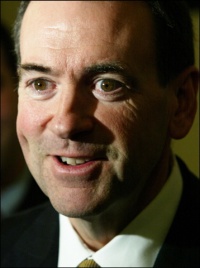 Here’s Mike Huckabee, quoted in The New Yorker:
Here’s Mike Huckabee, quoted in The New Yorker:
If somebody asked me, How do I get to Heaven, I would tell them that the only way I personally am aware of is faith in Christ, because I believe the New Testament. That’s the only map I got. Somebody says, Well, I got a different map. O.K.! You know what? If it works, I’m not going to argue with you.
Well, that makes sense. If somebody asked me, How do I get to Mount Rushmore, I would tell them that the only way I personally am aware of is Route 90, because I believe in Google Maps. Somebody says, Well, I got a different map. O.K.! You know what, if it works, I’m not going to argue with you. Unless, of course, I actually care whether you make it to Mount Rushmore or not, in which case I might take the trouble to defend my map.
I’ll be giving a couple of talks at this summer’s FreedomFest on economic growth, the power of incentives, and why More Sex is Safer Sex. More provocatively, I’ll also be going head to head with Dinesh D’Souza in a session called “Religion on Trial: Is God the Problem?”. Dinesh will argue that religion makes the world a better place, and I’ll argue the opposite. We’ll each call on the testimony of witnesses (in my case, Michael Shermer and Doug Casey). After our closing arguments, a jury of twelve, chosen from the audience, will deliver a verdict.
Dinesh has done this before; I haven’t. So I’m calling on you guys to help me out here by giving me your best arguments—either on Dinesh’s side, so I can practice rebutting them, or on my side, so I can plagiarize them.
Remember that the ultimate question is whether religion makes the world a better place, not whether religion is true. (On the other hand, truth becomes relevant if you’re arguing that religion makes the world a worse place by making people believe false things.) So what have you got for me?
 It is the season of both Lent and Passover, which means that for Christians and Jews it is the season of making small but pointless sacrifices. This always strikes me as mildly tragic. If you’re going to sacrifice your pleasures in order to feel virtuous, why not at least do it in a way that helps someone? Instead of giving up meat or leavened bread, donate a few hundred dollars to a worthy cause.
It is the season of both Lent and Passover, which means that for Christians and Jews it is the season of making small but pointless sacrifices. This always strikes me as mildly tragic. If you’re going to sacrifice your pleasures in order to feel virtuous, why not at least do it in a way that helps someone? Instead of giving up meat or leavened bread, donate a few hundred dollars to a worthy cause.
[Before you tell me that giving up meat is socially beneficial because it holds the price of meat down, remember that low prices are good for buyers only to exactly the same extent that they’re bad for sellers. Changing a price does no net good. The rigorous proof of this is part of the theory of pecuniary externalities, on which the Wikipedia entry is uncharacteristically useless.]
Observing Lent or Passover has much in common with things like running around a track: You push yourself to do something hard, you feel good about it, and you leave the world pretty much the way you found it. What a shame that you didn’t push yourself to do something useful instead. I bet you could have learned to feel almost as good about that.
There are roughly 30 million self-professed fundamentalist Christians in the United States. How many of them really believe what they say they do? New evidence suggests that the number is somewhere around 100. Either that or fundamentalism breeds exceptional callousness toward ones’ pets:
Many people in the U.S.—perhaps 20 million to 40 million—believe there will be a Second Coming in their lifetimes, followed by the Rapture. In this event, they say, the righteous will be spirited away to a better place while the godless remain on Earth. But what will become of all the pets?
Bart Centre, 61, a retired retail executive in New Hampshire, says many people are troubled by this question, and he wants to help. He started a service called Eternal Earth-Bound Pets that promises to rescue and care for animals left behind by the saved.
Promoted on the Web as “the next best thing to pet salvation in a Post Rapture World,” the service has attracted more than 100 clients, who pay $110 for a 10-year contract ($15 for each additional pet.) If the Rapture happens in that time, the pets left behind will have homes—with atheists. Centre has set up a national network of godless humans to carry out the mission. “If you love your pets, I can’t understand how you could not consider this,” he says.
Here is the full article by Mike Di Paola, writing in Business Week.
Edited to add: I shouldn’t have said 30 million fundamentalist Christians; I should have said (at least according to the Business Week article) 30 million who expect the Second Coming and the Rapture in their lifetimes.
 You know that metal plate in your bathtub? The one with the little lever on it that opens and closes the drain? What happens when the water level rises above that plate?
You know that metal plate in your bathtub? The one with the little lever on it that opens and closes the drain? What happens when the water level rises above that plate?
When my sister asked me this question over Thanksgiving dinner, I answered, with the utmost confidence, that it causes (quite instantaneously) an enormous flood. (Note the exact wording. This will be important later.) My sister nodded sagely and said “That’s what I thought, too.” My sister and I had the same mother, you see.
And then she asked, quite innocently, “So. How exactly does that work?”. And I was stunned—absolutely stunned—to realize not only that I had no answer to this question, but that there could not plausibly be an answer. Which somehow had never occurred to me in the half century or so that I’d been harboring this ridiculous notion.
As I mentioned the other day, I’ve recently (at the direction of my old friend Deirdre McCloskey) been reading some of the work of John Polkinghorne, the physicist-turned-theologian who seems to write about a book a week attempting to reconcile his twin faiths in orthodox science and orthodox Christianity.
Although Belief in God in an Age of Science is a very short book, it is too long to review in a single blog post. Fortunately, though, much of the non-lunatic content is concentrated in roughly the first ten pages, so I’ll comment here only on those.
Polkinghorne begins in awe. He is awestruck by the extent to which our Universe seems to have been fine-tuned to support life; this is the subject matter of the much-discussed anthropic cosmological principle. To take just one example (which Polkinghorne does not mention): The very existence of elements other than hydrogen and helium depends on the fact that it’s possible, in the interior of a star, to smoosh three helum atoms together and make a carbon atom; everything else is built from there. But it’s not enough to make that carbon atom; you’ve also got to make it stick together long enough for a series of other complicated reactions to occur. Ordinarily, that doesn’t happen, but now and then it does. And the reason it happens even occasionally is that the carbon atom happens to have an energy level of exactly 7.82 million electron volts. In fact, this energy level was predicted (by Fred Hoyle and Edwin Salpeter) before it was observed, precisely on the basis that without this energy level, there could be no stable carbon, no higher elements, and no you or me.
Deirdre McCloskey has changed my life several times, and always for the better. I had my first economics lessons from friends who were so inspired by Deirdre’s lectures that they felt compelled to repeat them to me over dinner; she was one of my most influential teachers long before I’d ever laid eyes on her. Later on, I had the privilege of knowing her personally, counting her as a treasured friend, and being repeatedly re-inspired by her twin passions to understand the world and to make it work better.
When I decided to write a textbook that competed directly with Deirdre’s own, she was my strongest booster. When I decided to follow up with a book for the general public—the book that became The Armchair Economist—Deirdre told me exactly how to sell it to the publishers. Fifteen years later, the Armchair Economist remains one of the bestselling popular economics books in at least six languages, and at multiple levels—intellectual, practical and personal—I owe it all to Deirdre.
So it was with considerable delight that I received Deirdre’s recent email with subject line “Your Splendid Book”. But as I fully expected (having had this conversation with her more than once), her praise was tempered with disapproval of my “adolescent” atheism:
I said this in The Big Questions and I’ll say it again: Richard Dawkins is an international treasure and one of my personal heroes, but he’s got this God thing all wrong. Here’s some of his latest, from the Wall Street Journal:
Where does [Darwinian evolution] leave God? The kindest thing to say is that it leaves him with nothing to do, and no achievements that might attract our praise, our worship or our fear. Evolution is God’s redundancy notice, his pink slip. But we have to go further. A complex creative intelligence with nothing to do is not just redundant. A divine designer is all but ruled out by the consideration that he must be at least as complex as the entities he was wheeled out to explain. God is not dead. He was never alive in the first place.
But Darwinian evolution can’t replace God, because Darwinian evolution (at best) explains life, and explaining life was never the hard part. The Big Question is not: Why is there life? The Big Question is: Why is there anything? Explaining life does not count as explaining the Universe.
Continue reading ‘There He Goes Again’